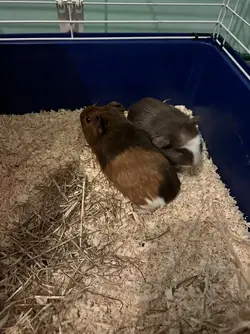Hi and welcome
Babies can weigh between 40g-120g at birth - that is a weight/size difference of three times, which generally carries on through life. Please be aware that 'average weight' is a human concept that by its arbitrarily mathematical definition only includes half of the numbers involved - what it does NOT tell you is whether any piggy inside the 'average' cluster group or outside of it is healthy or not as an individual. Any attempts of doctoring the weight to comply with the 'average' cluster by overfeeding will however lead to bad health and a shortened life span in the long term.
What really counts for long term health and longevity is to concentrate on a good normal hay based diet (should make at least three quarters of the daily food intake) with veg, a reduced amount of pellets and any occasional treats together replacing the supplementary role that wild forage used to have. As long as your piggies are healthy in themselves and a good weight/size ratio, they have every chance of maximising their genetically determined optimum by the time they reach adulthood at around 15 months just on a normal good diet.
Please take the time to read our comprehensive diet guide and our very helpful weight guide links. What counts is not whether your boys fall into the average weight category but that they are a good 'heft' or BMI at any age. A good diet can add as much as 1-2 years of life to a normal healthy life span, irrespective of whether you have a small, an 'average' or a large piggy, as long as they are not overweight at their individual size - which the heft/BMI hands-on check is for; it works for any age and size.
The weekly weigh-in is not for checking whether your piggies are 'average' or not but to monitor their food intake and development once you have established their individual ideal BMI. A small guinea pig can be overweight and a large piggy underweight in the 'average weight' range - just going by weight alone without checking for over/underweight can be very deceptive.
Weight - Monitoring and Management
Long Term Balanced General And Special Needs Guinea Pig Diets
If it helps you, the piggy I have had longest and who has celebrated her 8th adoption anniversary with me last year before passing away from old age was just 40g at birth and needed a helping hand in her first days, having been born to a newly rescued sow in bad state coming out of a true hellhole. She was always smaller than 'average', yet she has outlived both her bigger litter sisters (although one of them only died just days before her own 8th birthday). I've had also sadly average-sized piggies lost at a young age from a medical problem or an unfortunate genetic disposition. All you can do is boost their chances by focusing on their health and not on pushing them into categories that are ultimately irrelevant or potentially damaging.
Your boys are fine as they are and will have plenty of time to become healthy adults in their own ideal weight range in their own time.

PS: We have a very helpful practical tips and information starter bundle for new owners, which you may find useful. You may want to bookmark the link, browse, read and re-read at need. With several of the information guides you will pick up on different aspects at various levels of experience. Both the diet and the weight guide are part of it.
Here is the link:
Getting Started - Essential Information for New Owners
